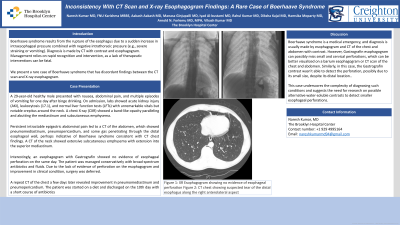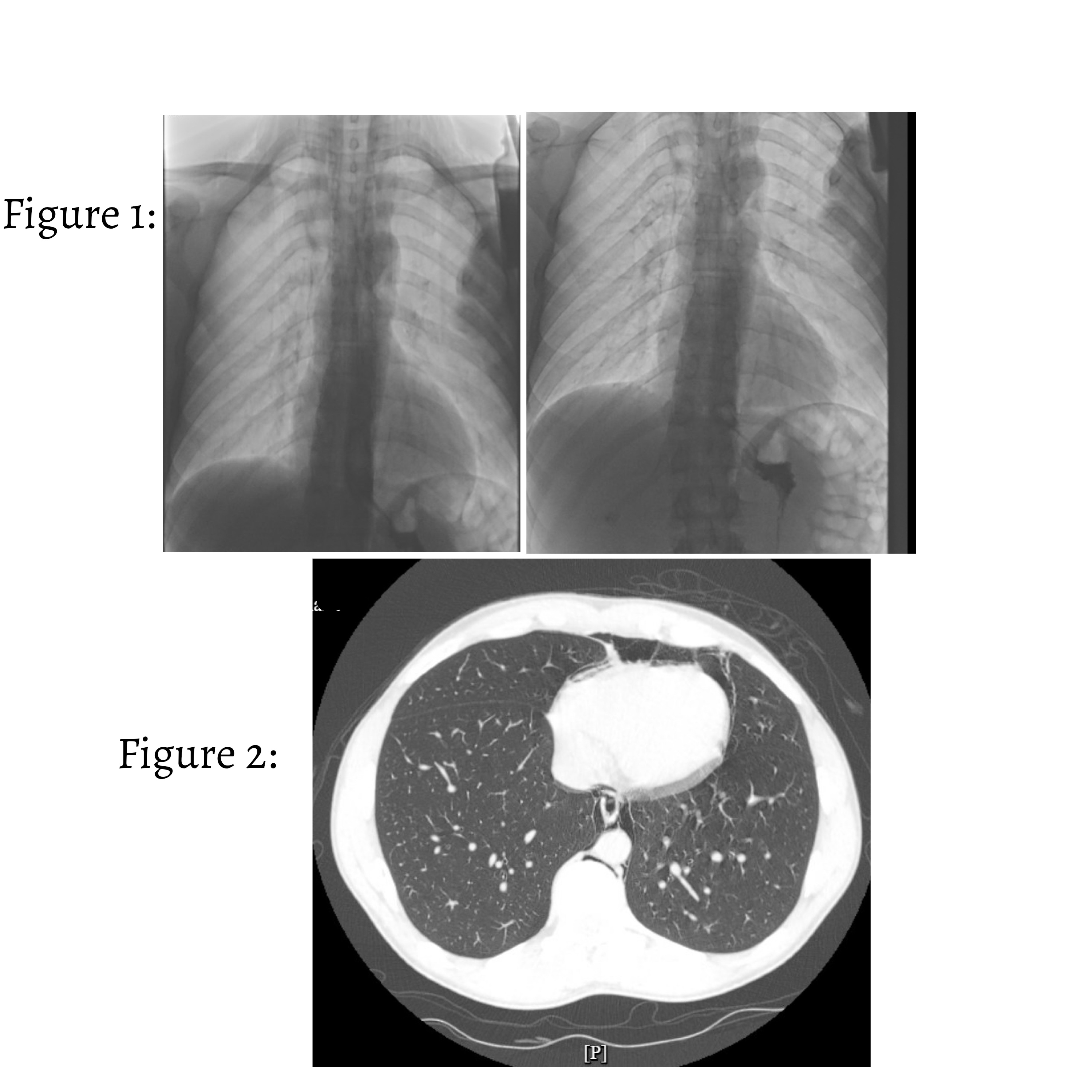Monday Poster Session
Category: Esophagus
P2313 - Inconsistency With CT Scan and X-ray Esophagogram Findings: A Rare Case of Boerhaave Syndrome
Monday, October 28, 2024
10:30 AM - 4:00 PM ET
Location: Exhibit Hall E

Has Audio

Naresh Kumar, MD
The Brooklyn Hospital Center
Brooklyn, NY
Presenting Author(s)
Naresh Kumar, MD1, Fnu Karishma, MBBS2, Aakash Aakash, MD3, Manasa Ginjupalli, MBBS, MD4, Iyad Al-bustami, MD, MPH(c)5, Rahul Kumar, MD6, Diksha Kajal, MD,7, Hamsika Moparty, MD1, Arnold N. Forlemu, MD, MPH8, Vikash Kumar, MD9
1The Brooklyn Hospital Center, Brooklyn, NY; 2Liaquat University of Medical and Health Science, Brooklyn, NY; 3Florida State University Cape Coral Hospital, Cape Coral, FL; 4The Brooklyn Hospital Center, New York, NY; 5Brooklyn Hospital Center, Houston, TX; 6Jacobi/ North Central Bronx Hospital Bronx, Bronx, NY; 7Florida State University College of Medicine, Cape Coral, FL; 8Brooklyn Hospital Center, Athens, GA; 9Creighton University School of Medicine, Brooklyn, NY
Introduction: Boerhaave syndrome results from the rupture of the esophagus due to a sudden increase in intraesophageal pressure combined with negative intrathoracic pressure (e.g., severe straining or vomiting). Diagnosis is made by CT with contrast and esophagogram. Management relies on rapid recognition and intervention, as a lack of therapeutic interventions can be fatal. We present a rare case of Boerhaave syndrome that has discordant findings between the CT scan and X-ray esophagogram.
Case Description/Methods: A 29-year-old healthy male presented with nausea, abdominal pain, and multiple episodes of vomiting for one day after binge drinking. On admission, labs showed acute kidney injury (AKI), leukocytosis (17.1), and normal liver function tests (LFTs) with unremarkable vitals but notable crepitus around the neck. A chest X-ray (CXR) showed a band-like opacity paralleling and abutting the mediastinum and subcutaneous emphysema. Persistent intractable epigastric abdominal pain led to a CT of the abdomen, which showed pneumomediastinum, pneumopericardium, and some gas penetrating through the distal esophageal wall, perhaps indicative of Boerhaave syndrome consistent with CT chest findings. A CT of the neck showed extensive subcutaneous emphysema with extension into the superior mediastinum. Interestingly, an esophagogram with Gastrografin showed no evidence of esophageal perforation on the same day. The patient was managed conservatively with broad-spectrum antibiotics and fluids. Due to the lack of evidence of perforation on the esophagogram and improvement in clinical condition, surgery was deferred. A repeat CT of the chest a few days later revealed improvement in pneumomediastinum and pneumopericardium. The patient was started on a diet and discharged on the 10th day with a short course of antibiotics
Discussion: Boerhaave syndrome is a medical emergency, and diagnosis is usually made by esophagogram and CT of the chest and abdomen with contrast. However, Gastrografin esophagogram can possibly miss small and cervical perforations, which can be better visualized on a barium esophagogram or CT scan of the chest and abdomen. Similarly, in this case, the Gastrografin contrast wasn't able to detect the perforation, possibly due to its small size, despite its distal location. This case underscores the complexity of diagnosing such conditions and suggests the need for research on possible alternative water-soluble contrasts to detect smaller esophageal perforations.

Disclosures:
Naresh Kumar, MD1, Fnu Karishma, MBBS2, Aakash Aakash, MD3, Manasa Ginjupalli, MBBS, MD4, Iyad Al-bustami, MD, MPH(c)5, Rahul Kumar, MD6, Diksha Kajal, MD,7, Hamsika Moparty, MD1, Arnold N. Forlemu, MD, MPH8, Vikash Kumar, MD9. P2313 - Inconsistency With CT Scan and X-ray Esophagogram Findings: A Rare Case of Boerhaave Syndrome, ACG 2024 Annual Scientific Meeting Abstracts. Philadelphia, PA: American College of Gastroenterology.
1The Brooklyn Hospital Center, Brooklyn, NY; 2Liaquat University of Medical and Health Science, Brooklyn, NY; 3Florida State University Cape Coral Hospital, Cape Coral, FL; 4The Brooklyn Hospital Center, New York, NY; 5Brooklyn Hospital Center, Houston, TX; 6Jacobi/ North Central Bronx Hospital Bronx, Bronx, NY; 7Florida State University College of Medicine, Cape Coral, FL; 8Brooklyn Hospital Center, Athens, GA; 9Creighton University School of Medicine, Brooklyn, NY
Introduction: Boerhaave syndrome results from the rupture of the esophagus due to a sudden increase in intraesophageal pressure combined with negative intrathoracic pressure (e.g., severe straining or vomiting). Diagnosis is made by CT with contrast and esophagogram. Management relies on rapid recognition and intervention, as a lack of therapeutic interventions can be fatal. We present a rare case of Boerhaave syndrome that has discordant findings between the CT scan and X-ray esophagogram.
Case Description/Methods: A 29-year-old healthy male presented with nausea, abdominal pain, and multiple episodes of vomiting for one day after binge drinking. On admission, labs showed acute kidney injury (AKI), leukocytosis (17.1), and normal liver function tests (LFTs) with unremarkable vitals but notable crepitus around the neck. A chest X-ray (CXR) showed a band-like opacity paralleling and abutting the mediastinum and subcutaneous emphysema. Persistent intractable epigastric abdominal pain led to a CT of the abdomen, which showed pneumomediastinum, pneumopericardium, and some gas penetrating through the distal esophageal wall, perhaps indicative of Boerhaave syndrome consistent with CT chest findings. A CT of the neck showed extensive subcutaneous emphysema with extension into the superior mediastinum. Interestingly, an esophagogram with Gastrografin showed no evidence of esophageal perforation on the same day. The patient was managed conservatively with broad-spectrum antibiotics and fluids. Due to the lack of evidence of perforation on the esophagogram and improvement in clinical condition, surgery was deferred. A repeat CT of the chest a few days later revealed improvement in pneumomediastinum and pneumopericardium. The patient was started on a diet and discharged on the 10th day with a short course of antibiotics
Discussion: Boerhaave syndrome is a medical emergency, and diagnosis is usually made by esophagogram and CT of the chest and abdomen with contrast. However, Gastrografin esophagogram can possibly miss small and cervical perforations, which can be better visualized on a barium esophagogram or CT scan of the chest and abdomen. Similarly, in this case, the Gastrografin contrast wasn't able to detect the perforation, possibly due to its small size, despite its distal location. This case underscores the complexity of diagnosing such conditions and suggests the need for research on possible alternative water-soluble contrasts to detect smaller esophageal perforations.

Figure: Figure 1: XR Esophagogram showing no evidence of esophageal perforation
Figure 2: CT chest showing suspected tear of the distal esophagus along the right anterolateral aspect
Figure 2: CT chest showing suspected tear of the distal esophagus along the right anterolateral aspect
Disclosures:
Naresh Kumar indicated no relevant financial relationships.
Fnu Karishma indicated no relevant financial relationships.
Aakash Aakash indicated no relevant financial relationships.
Manasa Ginjupalli indicated no relevant financial relationships.
Iyad Al-bustami indicated no relevant financial relationships.
Rahul Kumar indicated no relevant financial relationships.
Diksha Kajal indicated no relevant financial relationships.
Hamsika Moparty indicated no relevant financial relationships.
Arnold Forlemu indicated no relevant financial relationships.
Vikash Kumar indicated no relevant financial relationships.
Naresh Kumar, MD1, Fnu Karishma, MBBS2, Aakash Aakash, MD3, Manasa Ginjupalli, MBBS, MD4, Iyad Al-bustami, MD, MPH(c)5, Rahul Kumar, MD6, Diksha Kajal, MD,7, Hamsika Moparty, MD1, Arnold N. Forlemu, MD, MPH8, Vikash Kumar, MD9. P2313 - Inconsistency With CT Scan and X-ray Esophagogram Findings: A Rare Case of Boerhaave Syndrome, ACG 2024 Annual Scientific Meeting Abstracts. Philadelphia, PA: American College of Gastroenterology.
